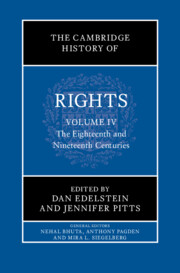Book contents
- the cambridge history of rights
- The Cambridge History of Rights
- The Cambridge History of Rights
- Copyright page
- Contents
- Figures
- Contributors to Volume IV
- General Introduction
- A Note on Translations
- Introduction to Volume IV
- Part I A Revolution in Rights?
- Part II Postrevolutionary Rights
- 12 On the Nadir of Natural Rights Theory in Nineteenth-Century Britain
- 13 The 1789 Declaration of the Rights of Man and of the Citizen
- 14 Rights in the Thought of Kant, Fichte, and Hegel
- 15 Rights and Socialism 1750–1880
- 16 Economic Liberalism and Rights in the Nineteenth Century
- 17 Human Rights during the 1848 Revolutions
- Part III Rights and Empires
- Index
- References
12 - On the Nadir of Natural Rights Theory in Nineteenth-Century Britain
from Part II - Postrevolutionary Rights
Published online by Cambridge University Press: 22 January 2025
- the cambridge history of rights
- The Cambridge History of Rights
- The Cambridge History of Rights
- Copyright page
- Contents
- Figures
- Contributors to Volume IV
- General Introduction
- A Note on Translations
- Introduction to Volume IV
- Part I A Revolution in Rights?
- Part II Postrevolutionary Rights
- 12 On the Nadir of Natural Rights Theory in Nineteenth-Century Britain
- 13 The 1789 Declaration of the Rights of Man and of the Citizen
- 14 Rights in the Thought of Kant, Fichte, and Hegel
- 15 Rights and Socialism 1750–1880
- 16 Economic Liberalism and Rights in the Nineteenth Century
- 17 Human Rights during the 1848 Revolutions
- Part III Rights and Empires
- Index
- References
Summary
This chapter examines the aversion to theories and programs of natural rights in much mainstream nineteenth-century British political discourse. Following on the heels of their Enlightenment and revolutionary efflorescence, writers in Great Britain articulated various critiques of natural rights philosophies and declarations. Moving from early critics such as Burke and Bentham to later Victorian writers and statesmen – most importantly, J. S. Mill – the chapter traces several threads of skepticism toward natural rights. British writers, it argues, were preoccupied less with the unsound conceptual foundations of natural rights theories than with the perceived consequences of belief in natural rights, which was seen as leading in anarchic, destabilizing, and antinomian directions. Natural rights platforms, it was contended, appealed to passion, ignored context and the weighing of costs and benefits, and undermined both the rule of law and state authority. In addition, natural rights theories were perceived by critics to be connected to a range of worrying trends (democratization and the rise of socialism, among others). Natural rights theories, furthermore, stood in stark contrast to the utilitarian and historicist attitudes towards law and government which prevailed in Britain during these decades. Finally, the conclusion offers a glance at nineteenth-century France, contrasting the loyalty toward natural rights across the Channel with British hostility, and revealing that many of the fears that Britons articulated about the dissemination of natural rights ideas were harbored by the French with regard to the spread of consequentialism.
- Type
- Chapter
- Information
- The Cambridge History of Rights , pp. 299 - 322Publisher: Cambridge University PressPrint publication year: 2024

